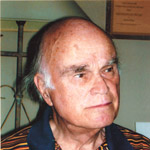David Braybrooke
May 2011 Honorary Degree Recipient

Doctor of Laws (honoris causa)
Dr. David Braybrooke, one of the most esteemed philosophers of our time, has been described by a colleague as both the “politician’s philosopher” and the “citizen’s philosopher.” We are honored today to have Dr. Braybrooke here with us on this special occasion.
This is something of a return to the Dalhousie stage for Dr. Braybrooke. He first came to this university in 1963 from Yale as a cross-appointed professor in the philosophy and political science departments. Even then, Dr. Braybrooke had an international reputation as a political philosopher. Over time, his presence here attracted some of our finest faculty members and students to Dalhousie’s campus.
After arriving here, Dr. Braybrooke soon found himself busier than ever. And that was good for Dalhousie, for his hard work and vision led to the development of two very strong departments in our Faculty of Arts and Social Sciences.
By the time Dr. Braybrooke left in 1990, he had transformed our philosophy department into arguably the strongest one in Canada. It reflected Dr. Braybrooke’s idea of what a great philosophy department should be: a place that fosters philosophical conversation and open discussion.
On campus, Dr. Braybrooke was a leader, mentor and popular teacher. His reputation for fair play and decency fostered a strong collegial atmosphere in his department and the university.
It was common for Dr. Braybrooke to go out of his way to share his work with colleagues and students, and to encourage critical dialogue. He hosted Wednesday lunches at the University Club for faculty, where ideas were shared informally. He set up weekly philosophy colloquia that often led to extended debates at the Grad House. He encouraged professors to involve undergraduates in research, valuing the fresh insights youthful minds bring to scholarly inquiry.
He also connected our university to the world by encouraging the foundation of the Austin & Hempel Distinguished Speakers series. For more than 20 years, this internationally-renowned lecture series has brought some of the greatest names in philosophy to Dalhousie.
All of this -- plus his offbeat, irreverent sense of humour -- endeared David Braybrooke to colleagues and students alike.
A sign of just how highly regarded he was, and is, can be seen in his festschrift -- a book of essays written in his honour. All contributors to the book, called Engaged Philosophy, are former faculty, students and friends whose essays address Dr. Braybrooke’s scholarly work.
In her contribution, Susan Sherwin, a professor emeritus at Dalhousie, says what differentiates David Braybrooke from other philosophers is how he situates philosophy “in the context of real world concerns of daily politics in an industrialized western democracy.”
Dr. Braybrooke’s philosophy captures underlying principles at work in everyday politics. The purpose of public policy, he believes, should be to meet human needs. What do we need to live a life worth living? First, determine the needs. Then, look at how rules and rights address these needs.
Throughout his life’s work as a philosopher, Dr. Braybrooke’s contributions have had a far-reaching influence. He has authored 11 books and published over 80 articles. Between 1998 and 2004, he published four books that integrate his major ideas into one corpus. For a man whose philosophical style is called “engaged philosophy” his engagement shows little sign of abating.
After leaving Dalhousie, Dr. Braybrooke moved to the University of Austin in Texas where he was appointed to the Centennial Chair in Government. He frequently returns to Dalhousie and still keeps a summer home in Nova Scotia. During his career, he held many prestigious fellowships, most notably at Hobart, Michigan, Bowdoin and Yale. He was president of the Canadian Philosophical Association and vice president of the American Political Science Association. He is also a Fellow of the Royal Society of Canada.
David Braybrooke has always been an inspiration to students. Many continue to translate his ethical philosophy into their careers as public servants. One former student, Heidi Hurd, worked to reform admissions practices at the University of Illinois Law School when she was its Dean. Another, Dr. Kishore Mahbubani, one of Dr. Braybrooke’s first graduate students, became President of the UN Security Council, a writer and distinguished diplomat. He also received an honorary degree from Dalhousie.
So, as we honored the student, today it is time to honour the teacher.
For his outstanding contributions to advancing philosophy, both in the academic world and far beyond, and for his lifelong commitment to education, I ask you, Mr. Chancellor, in the name of the Senate, to bestow upon Dr. David Braybrooke, the degree of Doctor of Laws, honoris causa.
